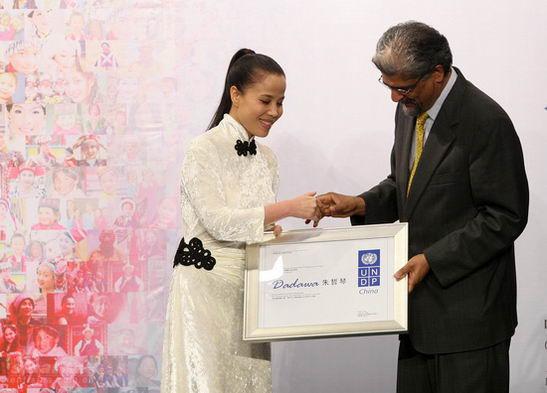"It's a brand new opportunity," said Chinese singer Zhu Zheqin, or Dadawa, who has been named a Goodwill Ambassador by the United Nations Development Program (UNDP).

Her new role involves protecting China's ethnic minority cultures.
"We just want to find one or two successful methods for cultural protection," said the diminutive Dadawa. "I'm not that ambitious."
Known for her Tibet-influenced song, "Sister Drum," Dadawa began to draw world attention to China's minority music in the 1990s.
After 10 years of traveling and singing, she was named as the UNDP ambassador on Jan. 8, and she's launched a two-year plan: "Show the World: Culture-based Development Goodwill Action for Ethnic Minorities in China".
"It will be two busy years" of travel, collecting, exhibiting and other public events, she said.
As a member of the Han nationality, the most populous in China, Dadawa was born in the southern Guangdong Province. "It is a fast-developing area where I strongly felt the absence of culture. That's why I have tried to spend so much time learning different cultures."
She was the first to integrate Tibetan elements into pop music when so many other musicians were busy imitating Western music. When she finished "Sister Drum," her best friend told her to throw the cassette away.
But the music world changed. "People love ethnic elements now, not only in China but also across the world," she said. "Still, we have too many such cultural elements that remain obscure or are simply disappearing."
"She is a gift for us," said Khalid Malik, UN resident representative in China. "Chinese ethnic cultures influenced not only the county but also the world. It's time to protect them," Malik said.
The cultural protection plan will take Dadawa to many provinces and autonomous regions, including Yunnan, Tibet, Xinjiang, Inner Mongolia and Qinghai. Her work will focus on music and handicrafts.
Dadawa plans to make two CDs. One will be a pure record of ethnic music; the other will be her own songs inspired by that type of music.
She said her team would not only record the music and other aspects of the unique cultures they encountered but also help develop them.
"I want to keep these cultures just as they are, but I also want to give them new life," she said.
She plans to invite internationally known artists to join the work. The names on her wish list include Peter Gabriel, Quincy Delight Jones II, Ryuichi Sakamoto, the German band Enigma, the Indian film composer A.R. Rahman, and China's own Tan Dun and He Xuntian.
"It will be a top-notch collaboration if they all get involved," she said.
Dadawa said she also planned to promote local handicrafts by staging several exhibits and forums. Dadawa said she would invite some of the world's top artists and designers to the remote counties she planned to visit. "Maybe we can make something happen," she said.
Malik said cultural preservation programs can also have an economic impact. For such people, "culture is an important part of their capital," he said.
"Take India, for example. Its biggest export is not technology but handicrafts," he said. The handicraft industry created 70 million jobs for India and helped drive its economic growth, he said.
Malik said he hoped the projects in Tibet and other regions would have a similar impact.
(Xinhua News Agency January 28, 2009)